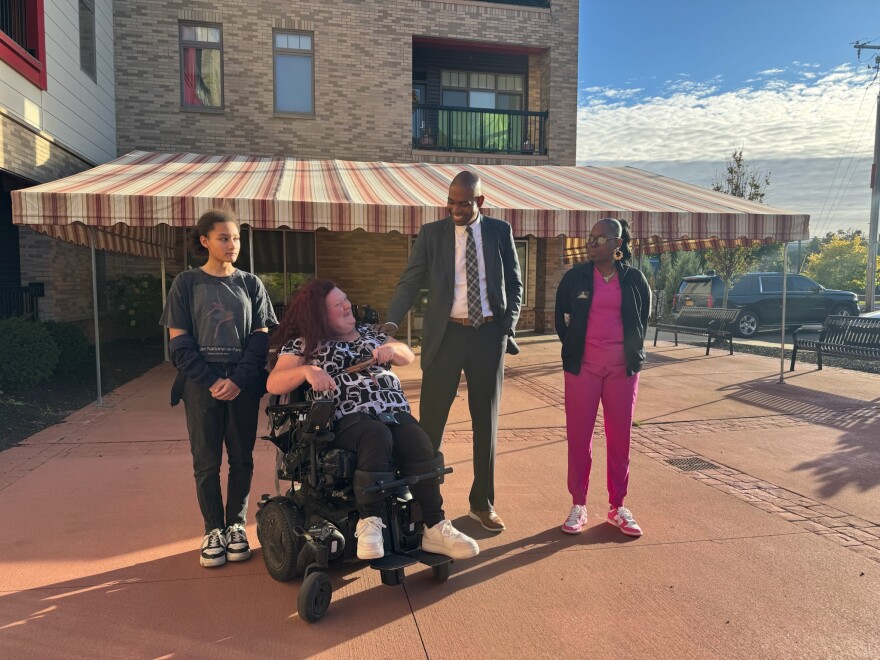Recently, Lieutenant Governor Antonio Delgado visited a Buffalo-area consumer of New York's self-directed home care program to hear her story. It was part of a visible pushback against his own governor's controversial revamp of the Consumer Directed Personal Assistance Program, or CDPAP.
This week on the Disabilities Beat, we explore the relationship between Delgado, who is running for Governor in the next election, and CDPAP consumers, who say they both want to see the system change.
TRANSCRIPT
This rush transcript may be updated over time to be more accurate.
Emyle Watkins: Hi, I'm Emyle Watkins, and this is the Disabilities Beat. Last month, Lieutenant Governor Antonio Delgado visited Renee Christian, a Buffalo area Consumer Directed Personal Assistance Program, or CDPAP, user. Christian has struggled to retain workers since the state switched to a single entity running the home care program. The visit was part of Delgado's visible pushback against his own governor's revamp of the program.
Antonio Delgado: I got a firsthand look at how critical having the type of care that you have familiarity with, that you have autonomy with, and independence with, and ideally, that you can track in a very seamless way and not burden yourself because of gaps in the system or because you're not sure whether or not the folks that you have and relying on to care for you are going to be paid on time or paid what they're owed, which adds more stress to an already difficult situation.
Emyle Watkins: CDPAP allows users like Christian to hire, train and direct her own home care workers, who are then paid using Medicaid funds by a fiscal intermediary. Before New York State switched to one company running the program, instead of 600, Christian had between six to 10 assistants who would be willing to pick up shifts. Now she's down to five, and she's worried she may lose more staff, as some have reported issues with getting paid on time or issues with their health insurance under the new fiscal intermediary. Christian says she was grateful for Delgado's visit as it brings more attention to the issue.
Renee Christian: It brings attention to the fact that we've been saying that all this stuff that's happening was going to happen before this transition ever happened. And we've been like, really, like, trying to avoid some of these hardships that we are the ones facing like the governor is not having to deal with not being able to go to the bathroom.
Emyle Watkins: But Delgado's campaign for changing CDPAP has led to questions as he pursues a gubernatorial primary against the current governor. I asked Delgado in an interview, what's his response to critics who say this is just part of him campaigning?
Antonio Delgado: My response is that I, you know, take on issues that I care deeply about, and my entire approach has been again, on any number of issues, to put the people first. One of the big reasons why I'm doing what I'm doing is because of the grotesque level of imbalance between corporate power and people power in our government. And the driving, the driving, inspiration for me is to course correct that, because if we don't course correct it, then folks will continue to lose faith in democracy.
Emyle Watkins: I also asked Delgado, how has learning about this issue influenced any policy or concrete decisions he would make if elected, for the disability community? Here's part of what he had to say.
Antonio Delgado: I do think that one of the things that's become very apparent throughout the course of this process is the lack of engagement by the current administration, whether it was the legislative actors who were ringing the alarm for months about this transition and its potential impact and the deadline that had been instituted, or whether it was the advocacy groups and those impacted directly, from the caretakers to those who are cared for, who repeatedly made it clear that this transition was going to be deeply problematic. It's not like those voices weren't being heard, and it's not like those voices weren't being received. In the end, there was a disconnect in terms of prioritization of those voices.
Emyle Watkins: And lastly, I asked Christian, having met him, does she think he'll hold to his promises to course correct CDPAP?
Renee Christian: I mean, I think that, you know, that could be a concern. But you know, I'm putting my faith in the word that he gave me when he was at my house. He looked me in my eyes, and, you know, made a promise to me, and you know, I will do everything that I can in my power as a person, if he gets to the office, to hold him to that promise, and I think he's aware of that.
Emyle Watkins: You can listen to the Disabilities Beat segment on demand, view a transcript and plain language description for every episode on our website at btpm.org. I'm Emyle Watkins, thanks for listening.


